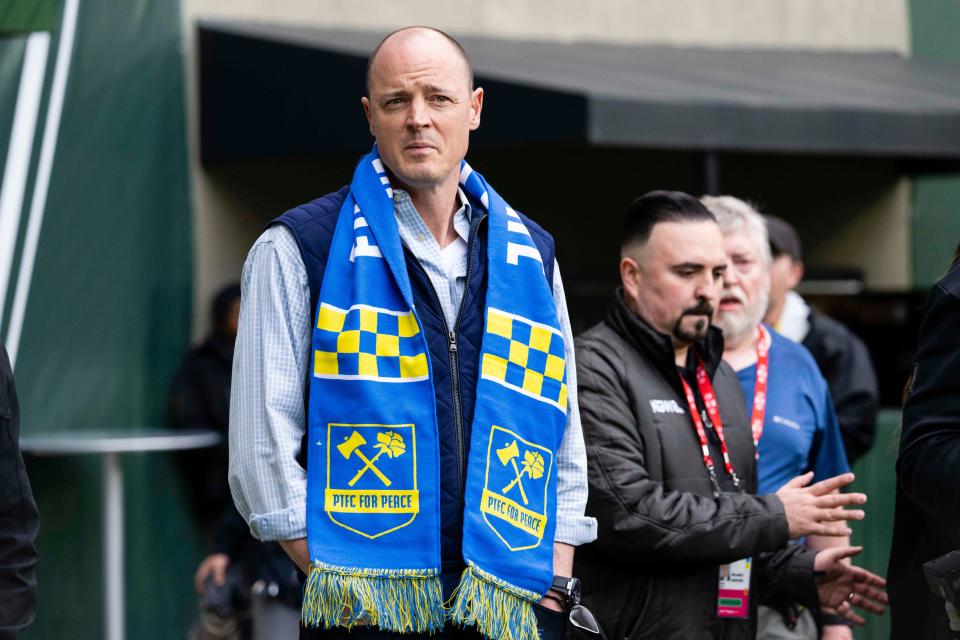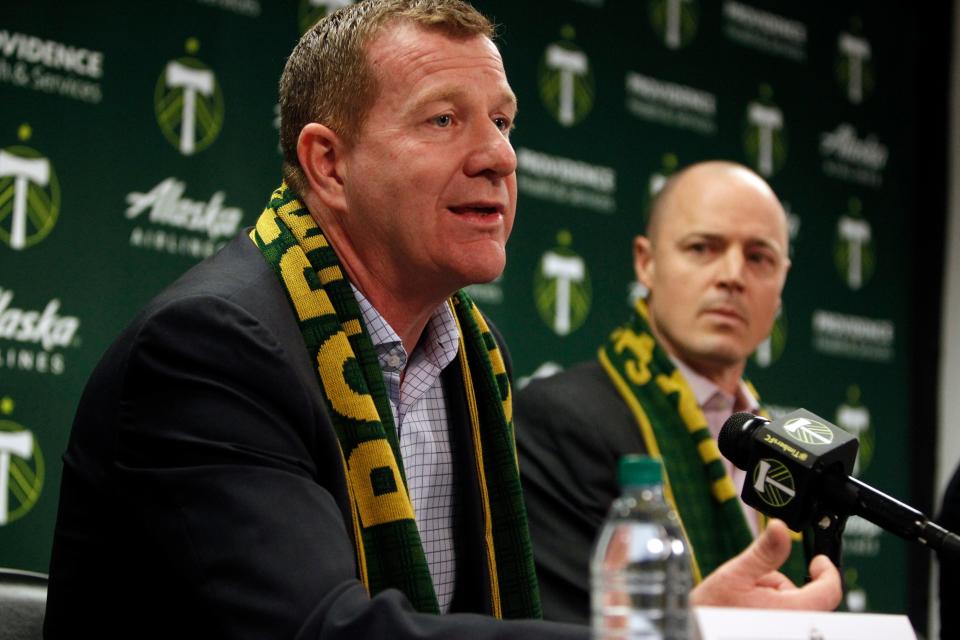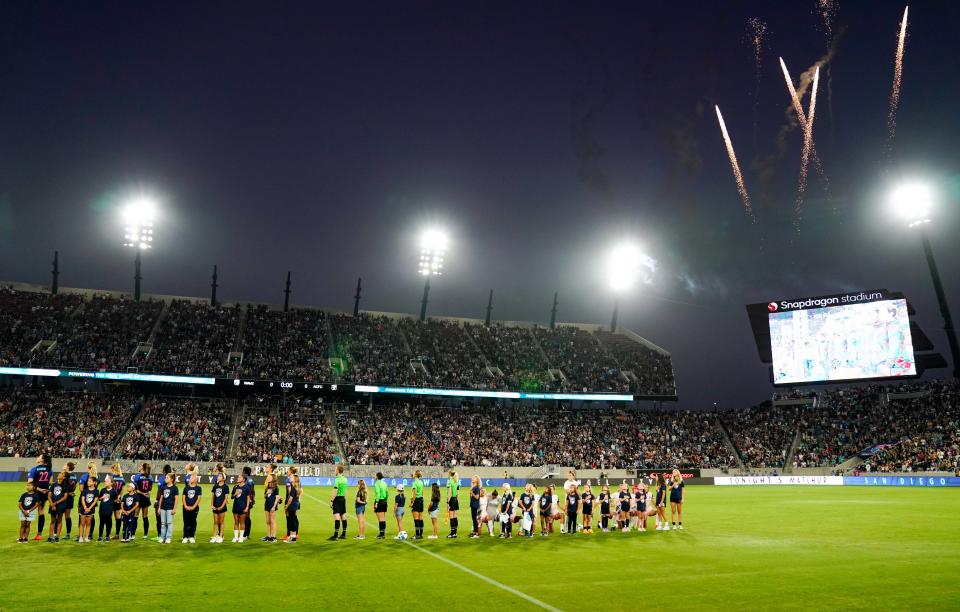Merritt Paulson's power lies with Portland Timbers, Thorns. Now, he's being pressured to sell
For more than a decade, no professional sports owner championed women’s soccer in America like Henry Merritt Paulson III.
A Harvard Business School grad and the son of a former U.S. Treasury Secretary, Paulson is a baseball fan turned soccer junkie whose passion for his teams, the Portland Timbers of MLS and the Thorns of the NWSL, is obvious and undeniable.
Frequently praised by MLS commissioner Don Garber for building Portland into the model of a thriving soccer club, men’s or women’s — the community is nicknamed “Soccer City” because of both clubs’ successes and rabid support — Paulson was one of the first to recognize women’s professional soccer could be big business in the States.
While other NWSL teams operated on shoestring budgets or were run like side projects, Paulson invested in the Thorns as he did the Timbers, assuring the team had top-notch accommodations and facilities, something other NWSL clubs struggled with for years.
His antics — trolling fans and players alike, whining about officiating and generally acting petulant online — were often overlooked because of his devotion to growing the sport in the U.S.
But now, this unconventional advocate of women's soccer poses a threat to the sport at a time when it's exploding in popularity across the country.
Under the surface, Portland was far from a model club. A damning investigation commissioned by U.S. Soccer and run by former U.S. Attorney General Sally Yates published Oct. 3 and revealed rampant abuse throughout the NWSL, zeroing in on mismanagement by Paulson and other Portland executives.
In response, some of soccer's biggest stars, along with furious fans, have called for Paulson to sell both teams and remove himself entirely from the game.
USWNT star Megan Rapinoe, who played college soccer at the University of Portland, called him out by name saying, “I don’t think Merritt Paulson is fit to be the owner of that team.”
A day after the report was released, Thorns star and USWNT co-captain Becky Sauerbrunn told reporters, “Every owner and executive and U.S. Soccer official who has repeatedly failed the players, and failed to protect the players, and has not participated fully in these investigations, should be gone.”
Paulson responded to the Yates report by firing two front office executives and removing himself as CEO, moves skeptics say are purely optics because as owner he still has final say on everything.
He’s previously told fans the other investigation being conducted on behalf of the NWSL and the players’ association — which is expected to release its findings sometime before the end of the year — will exonerate him. In the meantime, he’s desperately trying to hang on to the teams he loves so much.
Through a Timbers spokesman, Paulson declined to comment for this story.
The Yates report said Paulson was not transparent about why the club parted ways with former Thorns coach Paul Riley, who was accused by multiple players of unwanted sexual advances. Some industry experts say him continuing as owner is a risk to the league as a whole, and previous praise and success should not weigh in the decision.
“The question should not be, ‘What’s the risk to that team if he sells?” said Nicole LaVoi, the director of the Tucker Center for Research on Girls & Women in Sport at the University of Minnesota. “It’s, ‘What is the cost-benefit to the league and sport if he stays? What does it mean when we have men who are in control of women’s teams, if they’re tolerating abusive behaviors by (other) men in power?’”
But it goes beyond that. LaVoi echoed a thought multiple fans around Portland have expressed, too: If Paulson isn’t fit to own a women’s team given what happened, why would he be fit to own a men’s team?
“He didn’t sign a bad contract or make a bad investment in the stadium — he hurt people, his decision-making hurt players and he has hurt our community,” said Gabby Rosas, president of 107 Independent Supporters Trust, the board that governs the Timbers Army and Rose City Riveters fan groups. (107ist is named for the section of the stadium where the groups sit.)
Rosas said she doesn’t think “there’s a redemption story coming,” and knows the teams’ supporters won’t stay quiet as the Thorns continue their postseason Sunday with a semifinal against the San Diego Wave.
“I don’t know what his tipping point is, I don’t know how much pressure he can hold,” she said, “but we’re gonna give it to him.”

Paulson’s power
Among professional sports owners, Paulson is a somewhat unconventional fit.
Like many owners, he comes from money: His father, Henry Paulson, who served as treasury secretary under George W. Bush, has a reported net worth of more than $700 million. But while Merritt Paulson is wealthy, he is not a billionaire like MLS owners Dietrich Mateschitz (New York) and Stan Kroenke (Colorado).
Paulson, 49, initially purchased the Timbers on a lark of sorts. His investment group, Shortstop LLC, bought the Timbers as part of a package deal with the Portland Beavers, a baseball team that then belonged to the Pacific Coast League (Providence Park, where the Timbers play, has gone through many iterations over the years and used to be primarily a baseball stadium.) In 2010, Portland became the 18th MLS franchise, with Paulson footing the $40 million entry fee.
According to Sportico, Paulson sold a 15% stake in the Timbers and Thorns last year to Arctos Sports Partners, a private equity firm that has invested in more than a dozen other professional teams.
Paulson’s influence within soccer — both in his city and the sport at large — is clear. But his cache outside of Providence Park and the soccer world is basically nonexistent: Aside from charitable giving for conservation efforts, he isn’t visible as a civic leader. According to public records, he’s not a major political donor like other prominent sports figures in the city; Nike co-founder Phil Knight, for example, gave $3.75 million and $1 million, respectively, to the independent and Republican candidates for Oregon governor this cycle.
Since the Yates’ report, no major city or state leader has gone to bat for Paulson. In fact, all three gubernatorial candidates agreed on little else during their debate Wednesday night other than that Paulson should sell the Timbers and the Thorns. Current Oregon Gov. Kate Brown previously called for systemic change throughout women’s soccer and U.S. Senator Ron Wyden (D-Oregon) called the findings “devastating.” Neither named Paulson in their statements.
The three candidates for Oregon governor were asked during the Oregonian/OregonLive & KGW debate whether Merritt Paulson should sell the Timbers/Thorns. All three said yes.
— Jamie Goldberg (@Jamiebgoldberg) October 20, 2022
Within American soccer, however, Paulson has long been revered — mostly by Garber, who praised Paulson earlier this year for building “from scratch one of the great sports teams, in any sport, in our country, if not throughout North America.” That comment came despite recent evidence the Timbers mishandled a domestic violence incident involving Andy Polo, a former Timbers player.
Polo was suspended by both the Timbers and MLS, and his contract was later terminated. MLS fined the Timbers $25,000 in March for failing to disclose the allegations. Garber said he had “enormous faith and confidence” in Paulson despite the incident and various ongoing investigations involving the Timbers and Thorns.
Paulson also has a history of being churlish on Twitter and engaging in public spats with fans; he’s called them “idiotic” and “moronic,” and he’s notorious for deleting Tweets. He’s criticized officiating on social media as well, drawing significant fines. He deleted his account earlier this year.
In 2018, after Orlando forward Sydney Leroux called out Paulson and the Thorns for not allowing her son to come on the field after a Thorns-Pride game, Paulson went after Leroux on Twitter, writing, “Instead of inventing conspiracy theories and drama maybe you would be better off focusing on playing? Just a thought.” He later deleted the Tweet.
Still, Garber mostly placates him and it’s widely believed Garber will not lead a charge to banish him from MLS. According to MLS bylaws, it takes a vote of 75% of MLS owners to force out another owner. There’s no precedent for that, though an MLS and NWSL owner has been pressured to sell in the past: Former Real Salt Lake and Utah Royals owner Dell Loy Hansen "decided to sell," according to the league, after making racist remarks. The teams were sold separately.
Pressure mounts
The worst findings of the Yates report detailed sexual misconduct and abuse allegations against Riley, and how he continued coaching in the league after Portland let him go in 2015 because Paulson and other executives kept quiet.
A story published a year ago in The Athletic revealed the seedy truth: Two former Thorns players accused Riley of unwanted sexual advances and, after an investigation by the club, Riley was shown the door in 2015.
The Yates report went further, saying over the course of his career Riley “leveraged his position” to coerce at least three players into sexual relationships.
The Thorns shared their investigation’s findings with the league, but never publicly disclosed why Riley was gone. Paulson and other Thorns executives even gave Riley a good recommendation, according to the Yates report. Riley was then hired by the Western New York Flash in 2016, and again by the North Carolina Courage in 2017. He was fired by North Carolina following The Athletic’s story.
The Timbers Army and Rose City Riveters fan groups have called for Paulson to sell the team, saying in a joint statement, “The toxic culture that allowed these behaviors to exist and continue in our clubs’ organizations runs too long, too deep, and too high … Merritt Paulson and Peregrine Sports need to sell the teams.”
Paulson has taken incremental steps to placate angry supporters. The day after the Yates’ report was released, he fired president of soccer Gavin Wilkinson and president of business Mike Golub.

According to the report, Wilkinson blamed a former Thorns player for the Riley situation, telling another NWSL club that the player had “put Riley in a bad position” and he’d “hire him in a heartbeat.” Wilkinson has also been criticized for his handling of the Polo situation.
Meanwhile, Golub made a sexually inappropriate remark to former Thorns coach Cindy Parlow Cone, who is now the president of U.S. Soccer. Golub was also previously accused of fostering a “toxic” environment following an investigation published by The Oregonian in mid August.
Sponsors are speaking up, too. In the days after the Yates report became public, a local Portland mortgage company and a local wine company both severed their relationships with the clubs. Early last week, Alaska Airlines, the main sponsor of both the Timbers and Thorns, announced it was suspending its sponsorship and redirecting money for both teams to a fund formed by the NWSLPA to benefit players.
“You’ve seen so many sponsor pressures and sponsors leaving, it really does signal that having someone at the helm who clearly doesn’t protect or listen to players, having that infection probably will dissuade players from (signing) there,” said Anna Goorevich, a PhD student at Minnesota and a research assistant at the Tucker Center.
Paulson stepped down as CEO after Alaska Airlines’ announcement, handing responsibilities to interim president Heather Davis. And yet, his actions are not enough for those devoted to the game.
Fans who have spent years building up Portland as a shining example of how soccer can excel in America are deeply wounded by Paulson’s actions. But to them, the decision to sell is devoid of emotion.
“If he’s saying he didn’t understand how to do Human Resources, he’s not fit to run a business,” Rosas said. “This person did not know how to be a boss and a leader. There are hundreds of people who report up to him! You’re a boss, you’re a CEO and you don’t know what a fireable offense is? You don’t know what disciplinary action is? You cannot run a company, period.”
“The bottom line is, he led this club in a way that allowed a lot of pain and abuse. This is a business decision, and he has to go,” added Rachel Greenough, a Thorns season ticket holder. “Ultimately, whatever good has been done for women’s soccer because of him does not cancel out the harm that he has overseen in this club and in this league. I just don’t think you can come back from that.”
Portland pride
A few days after the release of the Yates report, a Portland Timbers and Thorns Twitter fan account shared a fake Craigslist post that drew chuckles from people in the know.
“For sale: Professional football club — slightly mismanaged — $600,000,000 OBO,” read the headline, with more detail in the description: “Bought this club a few years ago (thought it was a baseball team), and it has been nothing but trouble. Total buyer’s remorse.”
While $600 million, even for both teams, might be optimistic, Paulson will make a hefty return on his investment should he sell. Michele Kang paid $35 million, a record for an NWSL team, when she purchased the Washington Spirit earlier this year.
Money might not be enough to motivate Paulson to sell, however.
The Timbers and Thorns are not some fun side project for Paulson — they’re his day-to-day passion and he’s been more hands-on than many owners in professional sports, particularly in women’s sports.
But that’s changing throughout women’s soccer, especially in NWSL expansion cities like San Diego and Los Angeles. Angel City has some of the most active, out-front owners in the industry, led by a celebrity contingent: Oscar winner Natalie Portman is one of the founders, Serena Williams’ husband and Reddit co-founder Alexis Ohanian is the lead investor, while actresses Jessica Chastain, Jennifer Garner and Eva Longoria are investors and very public fans.
San Diego set NWSL single-game attendance records in both the regular season and the playoffs.

Paulson’s reputation as a trendsetter is impressive, but no longer necessary according to those who study sports economics. At this point, the Timbers and Thorns are booming businesses on their own and Portland will continue to thrive as Soccer City, USA, with or without Paulson’s stewardship.
“There’s a lot of evidence right now that the business of women’s sports is more viable now than anytime in the past,” said LaVoi, pointing to a study published earlier this year by the Tucker Center.
The Thorns’ success and popularity — the team has long led the league in attendance, averaging more than 14,000 fans per game — has proven women’s professional soccer in America can be a moneymaker.
The reports of systemic abuse are rocking the sport during a time of unprecedented fandom and growing monetary support, largely thanks to the success and activism of the U.S. women’s national team after winning back-to-back World Cups and churning out stars like Rapinoe, Alex Morgan and Crystal Dunn, who also plays for the Thorns.
“We’ve seen these big waves of support before — back in 1996, after the Olympics, and it petered out. Then again in ’99, after the World Cup, lots of support and then it petered out,” said Nancy Lough, a professor and co-director of the sports research and innovation initiative at UNLV. “I really think this one is sustainable — or I did until this scandal.”
Lough worries if sponsors bail, everything could collapse.
Continued fan support is less of a concern. For as integral as Paulson has been to the success of he NWSL in particular, he did not invent soccer fandom in the city.
Long before he showed up at Providence Park, the city turned out en masse for the original Portland soccer powerhouse – the University of Portland Pilot women, who won NCAA championships in 2002 and 2005.
Christine Sinclair, a Portland icon who has spent her entire NWSL career with the Thorns after being part of both title squads at UP, said earlier this week she has faith that support will continue for the Thorns and Timbers no matter what happens in the coming weeks.
“That’s here to stay,” Sinclair said. “The Thorns and the Timbers, that’s bigger than one person or two people or three people.”
Sinclair was noncommittal when asked if Paulson needs to sell the teams, saying off-field issues “can be dealt with in the offseason.”
One complicating factor in the fallout is that it would be difficult to sell the clubs individually given how intertwined their front offices are. But for some, the answer is clear, and selling only the Thorns isn’t an option.
“If Merritt Paulson isn’t fit to own a women’s team, then he should not be fit to own a men’s team,” Rosas said. “If this type of abuse and harassment and coverup is happening in his organization, Merritt Paulson should not be involved in soccer — at all.”
This article originally appeared on USA TODAY: Portland Timbers, Thorns owner Merritt Paulson pressured to sell teams

